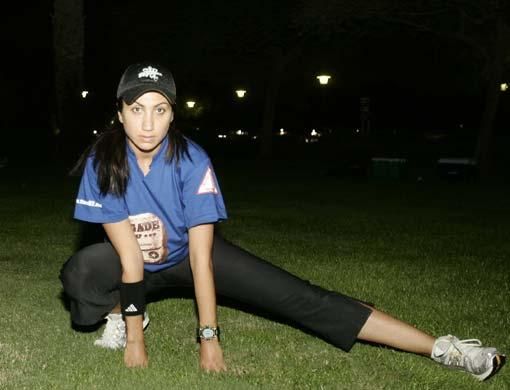It's safe to say that staying fit is a fight for most. Some people have a low metabolism, while others are just plain lazy. But some people are graced with a high-powered metabolism and have unlimited energy.
Even during Ramadan, when eating and drinking water must wait until iftar, they still jump into their sneakers, put on their sweatpants and do their daily fitness regime without fail. It might sound insane, but to them, it's no big deal. Just because it's Ramadan, it doesn't mean the world stops turning.
Hanan Wehbi, a business development manager from Lebanon, is fasting during Ramadan and still does her workout three times a week at Dubai's bootcamp training sessions.
"I do eat before I come to bootcamp. I have an hour and a half from when I break my fast until I come. I try to concentrate on foods that provide me with energy rather than just whatever that is put on the table," she said, adding that liquids are very important.
"I drink lots of water. I eat dates, lots of dates and a little bit of carbs, because this gives you energy. I can't exercise if I eat a huge dinner. I can't even move! I get cramps and indigestion. It's not a good idea to eat before exercising," Hanan said.
Contrary to popular belief, the 32-year-old doesn't feel any difference in her energy levels during Ramadan.
"There is no difference. I thought there would be difference, but it's all mental. You want to have iftar with your family, so you just get lazy.
"But, physically speaking, there is no difference whatsoever. Just because you don't eat for one day, does that mean you don't have any energy? I mean, you don't really get your energy on a daily basis. You just build it up. You can fast for five days — not eat or drink for five days and still have energy," she said.
Detoxing
But fasting is not new to Hanan. She confesses that she sometimes detoxes for 3 to 5 days without eating anything but drinking liquids.
"It just cleans your body. Afterwards your face feels cleaner, you're glowing and you feel energetic."
But Hanan, who has lived in Dubai for 10 years, admits that she does miss one thing during her fasting.
"I get lazy, because I miss the coffee, not the food. A lot of food is not good. That's why obese people are lazy. It's not about more food to give you more energy. It's about the right foods. And we eat all night too, so it's the same. It's not like you're starving yourself."
Twenty-nine-year-old Zena Habi, who is a trainer at the Renegade Bootcamp courses, is also fasting during Ramadan Despite the fact that she's incredibly fit, she admits it's not the easiest time to exercise.
"It gets harder during Ramadan because you get dehydrated. No matter how much you drink, you always need water when you exercise. It's a good thing for detoxifying and all that, but then you need lots of water," she said.
The Jordanian trainer avoids huge iftar dinners before working out.
"I eat a little bit before I come to bootcamp."
But back in Amman, where she competed in kickboxing and taikwondo for seven years — and won the title of Jordan Champion in kickboxing for two consecutive years — she had a particular regime.
"When I used to be training during Ramadan, I used to take four small meals, so I had the energy the next day for exercising," Zena said.
"Right now it's mainly the dehydration that's the issue, not so much the food. But I think it's because of the heat here," she said.
Healthy cooking
Small changes in your cooking make healthy food.
Here are some tips:
- Always trim off excess fat before cooking.
- Remove poultry skin before or after cooking.
- Choose light meat (breast) instead of dark meat (leg, wing).
- Bake, grill or roast foods rather than frying.
- Vegetables should be steamed or boiled with as little added fat as possible.
Avoid
- Fried and fatty foods.
- Too much salt. Try adding sliced lemon or lemon juice.
- Foods containing too much sugar.
- Over-eating, especially at suhour.
- Too much tea at suhour.
- Smoking.
Eat
- Harees, an Arabic wheat porridge, is an excellent source of protein and is a slow-burning food.
- Dates are an excellent source of sugar, fibre, carbohydrates, potassium and magnesium.
- Bananas are a good source of potassium, magnesium and carbohydrates.
- Almonds are rich in protein and fibre with little fat.











